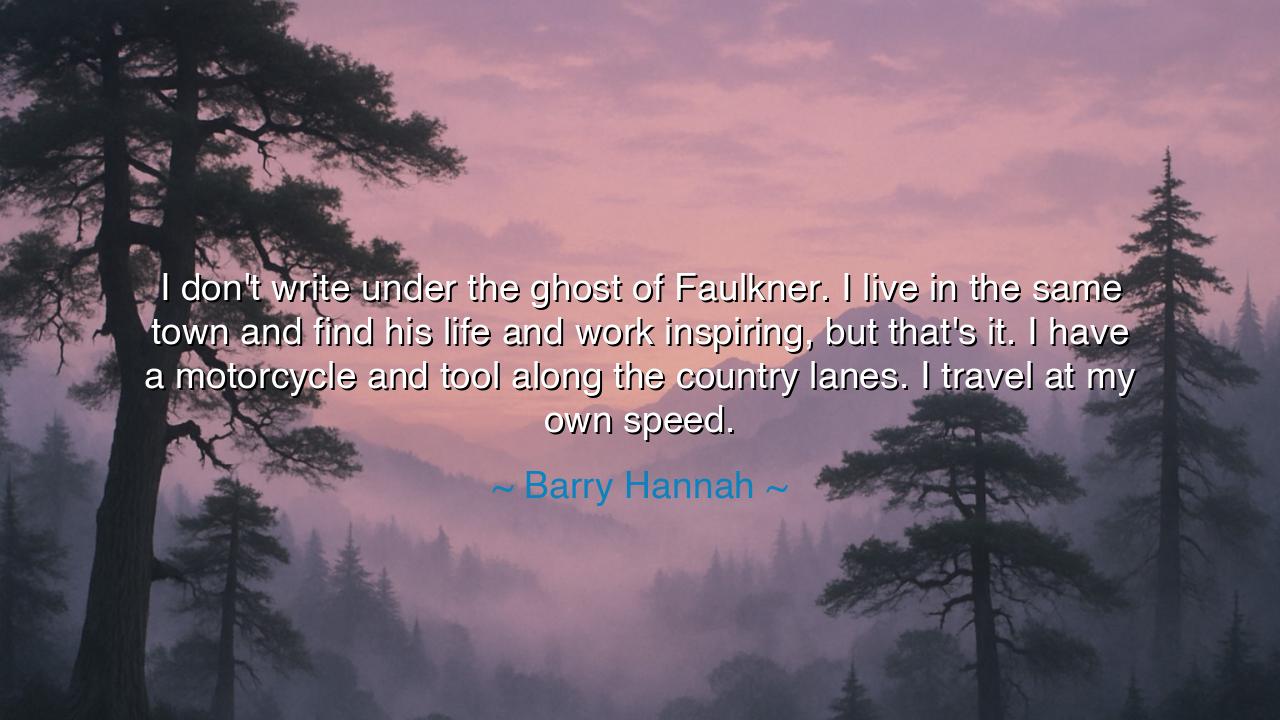
I don't write under the ghost of Faulkner. I live in the same
I don't write under the ghost of Faulkner. I live in the same town and find his life and work inspiring, but that's it. I have a motorcycle and tool along the country lanes. I travel at my own speed.






Hear the voice of Barry Hannah, who proclaimed with courage and clarity: “I don’t write under the ghost of Faulkner. I live in the same town and find his life and work inspiring, but that’s it. I have a motorcycle and tool along the country lanes. I travel at my own speed.” These words are more than the simple musings of a writer—they are a declaration of independence, a statement of how a soul may dwell near greatness yet not be enslaved by it. For to walk in the shadow of giants can either crush the spirit or challenge it to blaze its own trail.
The essence of this saying lies in the refusal to be dominated by the ghost of Faulkner. William Faulkner, master of Southern literature, loomed over Oxford, Mississippi, as a monument of genius. Many who came after might have trembled beneath such weight, their pens paralyzed by comparison. But Hannah declares that while Faulkner’s presence is inspiring, it does not dictate his path. He acknowledges the greatness of another, yet insists upon his own road, his own rhythm, his own music. This is the eternal balance of respect without surrender, of learning from the past without becoming imprisoned by it.
The image of the motorcycle is no idle detail—it is a symbol of freedom. To “tool along the country lanes” is to reject the rigid paths carved by others and to embrace the winding, unpredictable journey of the self. A motorcycle moves not with the heavy weight of history but with the swiftness of choice. It is the vehicle of one who lives by instinct, by risk, by wind and open sky. Hannah’s metaphor teaches us that though we honor the roads paved by others, we must also feel the thrill of carving our own.
Consider the life of Vincent van Gogh, who painted in the time of giants like Monet and Cézanne. He admired them, yes, but he did not chain himself to their style. Instead, he burned with his own vision, his own speed, painting with wild strokes of color that the world at first despised but later revered. Had Van Gogh bowed too deeply to the shadows of others, his light would never have pierced through history. So too Hannah reminds us: greatness is not found in imitation, but in the courage to be distinct.
There is a danger in dwelling too closely upon the works of the past. To revere too much is to lose the fire of creation, to let another’s ghost walk in your own skin. Yet there is also danger in refusing to honor those who came before. The wisdom, then, is balance: respect the masters, be inspired by them, but do not mistake their road for your own. As Hannah said, he lives in the same town, sees the same landscapes, breathes the same air—but he does not write the same story. Each spirit must ride its own machine of destiny.
The lesson is clear: travel at your own speed. Do not measure your steps against those of others, nor chain your vision to the expectations of the past. The path of comparison is endless and exhausting. The path of selfhood, though uncertain, is the only road to true creation. Every person, whether writer, worker, dreamer, or wanderer, must learn to trust their own pace. For some, destiny unfolds quickly; for others, slowly. What matters is not the speed, but the authenticity of the journey.
In practice, learn to admire without imitating. Read the works of the great, study their wisdom, but then put down the book and pick up your own pen. Ride your motorcycle—whatever that may be in your life—down the country lanes of your own choosing. Resist the pull of envy, for it will always whisper that another’s way is superior. Instead, hear the steady hum of your own engine, the call of your own horizon. In this way, you honor the past without surrendering the present, and you claim the one gift no ghost can ever give you: the freedom of being yourself.
Thus, Hannah’s words live not merely as a comment on literature, but as a teaching for all time. Respect the ghosts, but do not bow to them. Let them inspire, not imprison. For life is too brief to walk only in the footsteps of others—you must also leave behind the imprint of your own.






AAdministratorAdministrator
Welcome, honored guests. Please leave a comment, we will respond soon